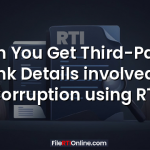How to Use RTI to Support Your Consumer Case: Can You Get Crop Value & Insurance Details from Banks?
The Right to Information Act is not just for transparency in government offices—it is also a powerful tool for farmers, borrowers, and consumers who want documents to support their cases in Consumer Forums, Civil Courts, or Banking Ombudsmen.
Farmers often face problems such as:
- Wrong insurance premium deducted
- Bank not settling crop insurance claims
- Confusion about KCC loan charges
- Disputes regarding crop value assessment
In all these situations, RTI can help you gather the official records needed to prove your claim.
Let’s understand this better through a real case.
Case Example: Seeking Kharif Crop Value & Insurance Premium Details
A farmer (the appellant) filed an RTI application with Samastipur Kshetriya Gramin Bank (SKGB) asking for:
- Months during which the kharif crop was harvested
- Total value of the harvested crop
- Name of the insurance company
- Insurance premium paid under crop insurance
- Details relating to his Kisan Credit Card (KCC) loan
Bank’s Response
The PIO denied the information using Section 8(1)(g), claiming its disclosure might:
- Endanger the life or safety of someone
- Reveal confidential sources of information
This section is usually used for law enforcement and security cases, not for crop or bank-related queries.
CIC’s Observations
The Central Information Commission clearly stated:
- The section used to deny the information was irrelevant.
- There was no risk to anyone’s safety in providing crop value or insurance details.
- The farmer was asking for information related to his own account, not third-party records.
- The information was needed for a consumer case filed farmer.
Thus, there was no valid reason to deny access.
Final Decision
CIC directed the bank to provide the complete information requested.
This strengthened the farmer’s case in the Consumer Forum.
Why This Case Is Important
This case teaches three key lessons:
✔ 1. You can use RTI to get records needed for consumer disputes
Banks and insurance companies often delay or deny information. RTI forces them to disclose official documents.
✔ 2. Banks cannot misuse RTI exemptions
Sections like 8(1)(g) cannot be used casually. They apply only to serious security-related matters, not crop or loan data.
✔ 3. You can seek information related to your own loan, account, or insurance
There is no privacy issue when you are the account holder.
What Information Farmers Can Seek Under RTI
If you have taken a KCC loan, crop loan, or crop insurance, you can request:
✔ Insurance premium deducted
✔ The name of the insurance company
✔ Proposal form submitted
✔ Surveyor report
✔ Crop value assessed
✔ Claim amount forwarded bank
✔ Reasons for delay or rejection of claim
✔ Correspondence between bank & insurer
✔ Guidelines followed for premium deduction
All of this is your personal account information, so it must be provided.
What Banks Cannot Deny Using RTI
Banks often wrongly deny information saying:
❌ “Sub-judice matter”
RTI Act clearly says information cannot be denied even if a case is ongoing.
❌ “Not related to public interest”
Not applicable when the information relates to your own account.
❌ “Confidential information” under Section 8
Cannot be used unless disclosure genuinely threatens someone’s safety or reveals protected sources.
In this case, the CIC confirmed that the denial was baseless.
How to Use RTI Strategically for Your Consumer Case
If you are fighting before a Consumer Forum, here’s how RTI helps:
Step 1: Collect all documents via RTI
Get official records that support your case.
Step 2: Submit these documents as evidence
RTI responses are admissible as proof.
Step 3: Ask for Action Taken Reports
This exposes delays and negligence bank.
Step 4: Strengthen your compensation claim
If the bank acted wrongly, you can claim compensation for:
- Mental harassment
- Delay in service
- Deficiency in service
Conclusion
RTI is a powerful tool for farmers and consumers dealing with loan or insurance disputes.
This case clearly shows:
If the information relates to your own loan, crops, or insurance, the bank must provide it—RTI exemptions cannot be misused.


